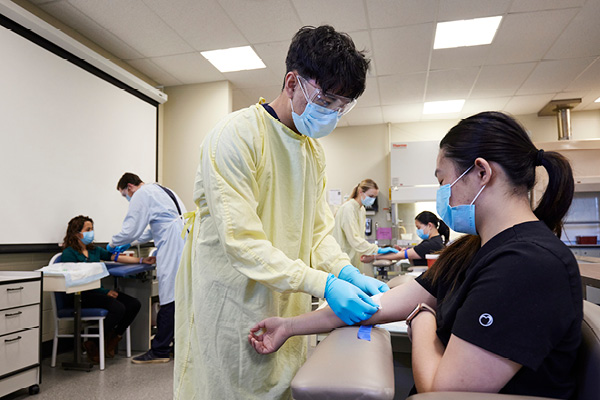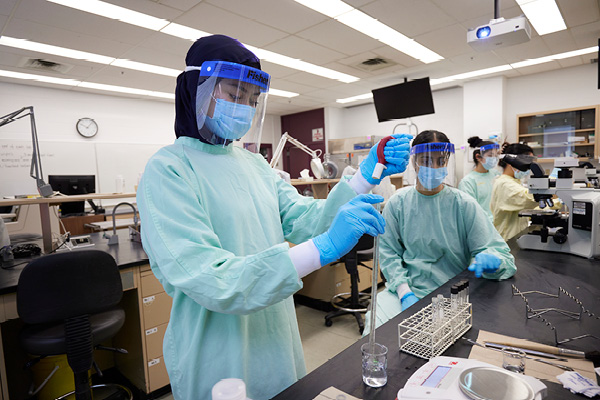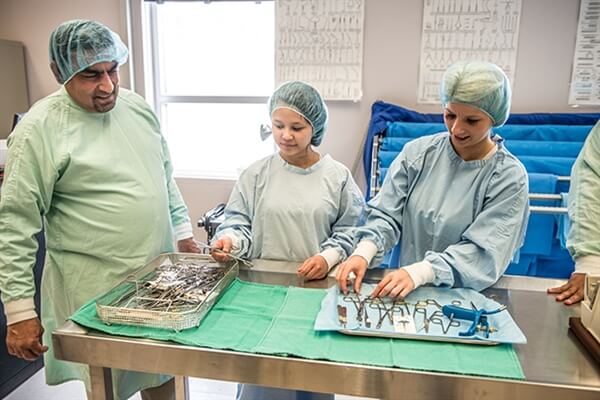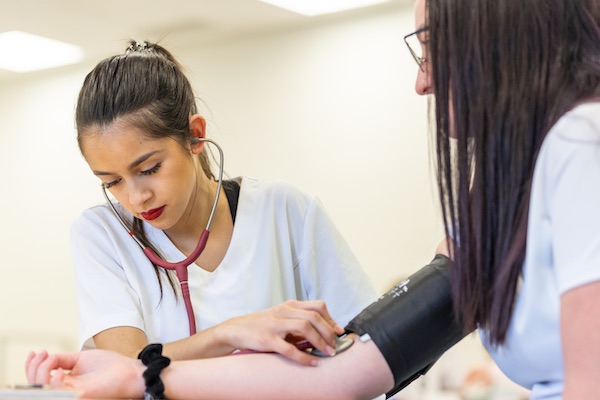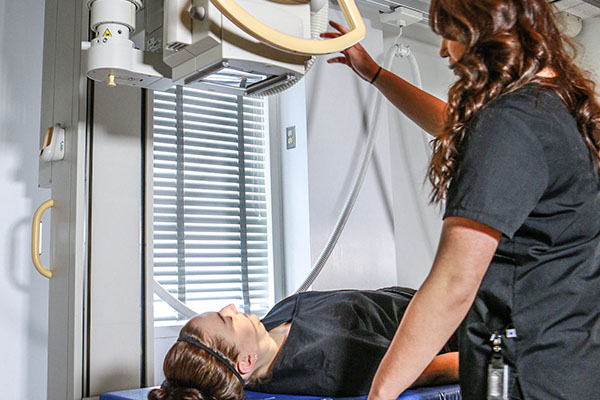On this page:
Mandatory requirements
Applicants for this program are required to complete the School of Health and Public Safety entrance testing process as an admission requirement for this program by the set deadlines. Review admission requirements for more details.
Overview
The fast-track Medical Laboratory Assistant program will equip you with the skills, applied knowledge and professional behaviour required to become a proficient lab assistant.
You'll be prepared to work in various medical laboratories which are evolving rapidly to accommodate growing advancements in medical technology and healthcare.
In this program, you will:
- learn to accurately collect, label and process blood, tissue and other specimens in a biosafety laboratory for analysis
- develop the technical skills to enter patient data into laboratory information systems
- gain experience in handling front-desk operations and office administration, including patient interaction and administrative tasks
- train to perform procedures such as electrocardiograms (ECGs) and urinalyses or point-of-care tests as part of a laboratory team of professionals
- gain professional responsibility, including scope of practice, ethics, communication, critical thinking, accountability and how to collaborate professionally.
Engage in real-world scenarios to integrate clinical knowledge with practical skills. You'll participate in a SAIT-arranged practicum in a medical laboratory and patient service center to refine and apply your skills in a real-world setting.
As a graduate, you can pursue employment opportunities in various settings, including community health centres, hospitals, medical laboratories, mobile clinics, insurance companies, or private home care.
Those in the medical laboratory assistant field need:
- fine motor skills
- critical thinking and adaptability
- effective communication skills
- the ability to work independently
- the ability to work well under stress, maintain professional behaviour and emotionally self-regulate
- the ability to use technology
- attention to detail
- to tolerate the sight of human blood and tissue samples
- the ability to assist in transporting, lifting and positioning patients and equipment and meet the physical demands of the job (for example, using your hand, wrist and arm for prolonged periods)
- normal colour vision
- the ability to sit for long periods (three to four hours)
- the ability to type at 30 wpm with high accuracy.
Medical laboratory assistants need to wear personal protective equipment (PPE) for extended periods, which includes exposure to latex and disinfection chemicals. You must also be comfortable performing patient care procedures that may be sensitive or conducted in very close proximity to the patient.
You may also work extended hours and shift work, including evenings and weekends.
You are strongly encouraged to refer to the ALIS website for career, learning, and employment information for medical laboratory assistants to ensure you can successfully meet the occupational requirements for the program and profession.
You will participate in a practicum at a medical laboratory and patient service centre as part of this program.
You will be assigned practicum placements with consideration given to your preference of location. However, due to limited availability in Calgary, it might be necessary for you to travel or relocate outside the city.
The healthcare field has a strong focus on health, wellness, and fitness to practice due to the demanding nature of the work and Occupational Health and Safety requirements. As such, special considerations will not be granted based on individual circumstances or preferences, except those stated as protected grounds when an accommodation has been approved.
If you are beginning this program as part of the Rural Health Zone (RHZ) intake, all practicum placements will occur in rural Alberta, and will not include sites in Calgary or Edmonton.
In compliance with the practica agreements with our clinical partners, you will be required to provide specific documentation before you can participate in your practicum. Find out what requirements you need for this program.
This program offers a Rural Health Zone (RHZ) intake in the Spring semester. Only applicants with a home address (living) in the region will be eligible for admission to the program through this intake.
This program is accredited by Accreditation Canada. It is designed to ensure graduates achieve clinical competence as defined by the Canadian Society for Medical Laboratory Science (CSMLS).
As an accredited institute, SAIT Medical Laboratory Assistant graduates are eligible to challenge the CSMLS certification exam. Obtaining national certification as a medical laboratory assistant will allow you to work across Canada. Visit CSMLS to learn more about their licensing requirements, mandatory registration, and declaration of conduct.
Upon successful completion of this program, you'll receive a SAIT Medical Laboratory Assistant certificate.
Careers and opportunities
Each year, SAIT conducts a survey between February and April to determine the employment rate, salary and satisfaction of our newest SAIT alumni.
![]() 92% graduate employment rate
92% graduate employment rate
![]() $49,338 average starting salary
$49,338 average starting salary
Find out more about our graduate employment statistics >
Our graduates may work in the following occupations. Some careers require additional experience and education.
Associated National Occupational Classification (NOC) codes: 32120, 32129, 33101, 33109.

Career planning support
Unsure which career path is for you? Here are some recommended career planning resources to help you decide your future.
You can also head to Alberta alis for lots of information about careers in Alberta, including quizzes and labour market information to help you narrow down a path.
Finally, you can take our online career finder quiz, which can help narrow your options based on your current skills and interests.
Courses
The Medical Laboratory Assistant certificate requires 19.5 credits (eight courses) to complete.
The program spans 21 weeks over two semesters.
| Course | Credits |
|---|---|
|
This course introduces the chain of infection, and methods to reduce the risk of transmission of microorganisms to healthcare providers and patients. Topics include immunization, routine practice, contact and droplet precautions, sterilization and disinfection, safety, and the Workplace Hazardous Materials Information System (WHMIS). |
1.5 |
|
Clinical Laboratory Foundations provides an overview of laboratory departments. Pre-analytical processes and microscopy will be introduced. Lab ware and equipment will be used for reagent and specimen preparation following quality assurance principles. Safety in the workplace will be emphasized throughout this course. |
3 |
|
Patient Services introduces techniques commonly used for obtaining, accessioning and preparing specimens for analysis. The theory and practice of electrocardiography (ECG) will also be applied. Routine practices will be applied for all techniques covered in this course. |
3 |
|
This course provides an opportunity for applying foundational skills and theory in a simulated clinical laboratory. Learners will incorporate safe work practices, analytical procedures, professional practices and quality management into their daily laboratory work. Emphasis will be placed on developing time management, multi-tasking and critical thinking skills. |
1.5 |
|
Clinical Laboratory Testing outlines quality management and testing procedures performed by medical lab assistants in a clinical laboratory setting. Routine urinalysis, point of care testing, and loading of specimens for analysis will be performed. |
3 |
|
This practicum course provides learners with opportunities to apply the skills, knowledge, and attitudes required for medical laboratory assistants in approved clinical laboratories. Pre-requisites:Manual Prerequisite
Corequsites:
|
3 |
|
Professional Practice 1 introduces basic medical terminology and fundamental communication skills for working in a healthcare environment. Focus will also be placed on patient-centered care and governing bodies that direct professional practice. |
3 |
|
This course provides learners with opportunities to apply quality management system essentials necessary for working effectively in the medical laboratory professions and according to the scope of practice. Pre-requisites:Manual Prerequisite
Corequsites:
|
1.5 |
Progression
You must attain a PGPA and/or a CGPA of 2.0 or better each semester and pass the prerequisite courses to progress through the program.
To qualify for graduation, you must pass all courses, attain a CGPA of 2.0 or better and complete course requirements within the prescribed timelines.
Review our grading and progression procedure >

Explore your options!
Some courses in this program are available through Open Studies. You can complete courses via Open Studies to get a head start on your education, reduce your course load once accepted into a credentialed program, or determine which career path best suits you before you fully commit.
You may also take courses for general interest or personal and professional development.
Admission requirements
Applicants educated in Canada
Applicants must demonstrate English language proficiency and meet the following requirements or equivalents:
- at least 60% in Math 20-2 or Math 10C, and
- at least 60% in English Language Arts 30-1 or English Language Arts 30-2, and
- at least 60% in Chemistry 20, and
- at least 60% in Biology 20
You must also achieve a mark of at least 50% in the School of Health and Public Safety's entrance testing process.
SAIT accepts high school course equivalents for admission for applicants educated outside Alberta.
All applicants who were educated outside of Canada must demonstrate English language proficiency and provide proof they meet the program admission requirements outlined above with an international document assessment. Find accepted educational documents and assessment options.
SAIT may also accept courses completed at certain international post-secondary institutions.

Academic Upgrading
Missing an admission requirement for this program? Upgrade your prior education to help you receive admission into one of SAIT's career programs.

English language proficiency
All applicants must demonstrate English language proficiency prior to admission, including students educated in Canada.
Transfer agreements
At SAIT, we evaluate post-secondary credit you have previously earned and apply it to your SAIT credential. Explore our formal transfer agreements available for this program.
We can evaluate your prior education, even if we don't have a formal agreement in place.
Submit a transfer credit application
There are no formal transfer agreements currently in place for this program.
Transfer options for graduates
Build on the knowledge you’ve learned at SAIT. The opportunity to advance your education at an accredited post-secondary institution may be available.
🔗 Visit Transfer Alberta search tool for all transfer agreements in Alberta (including UCalgary, MRU and BVC).
If there are transfer agreements with other institutions outside of Alberta, nationally or internationally, they will be listed below.
Available intakes
Spring 2025
Start dates:
- Rural applicants only: Open
-
-
Application deadline: April 30, 2025
-
Fall 2025
Start dates:
- Domestic students: Waitlisted
-
-
Application deadline: March 31, 2025
-
Winter 2026
Start dates:
- Domestic students: Open
-
-
Application deadline: Oct. 24, 2025
-
Costs
2025/2 tuition and fees
The following estimated costs are effective as of July 1, 2025.
The estimated total cost of tuition and fees is based on the suggested schedule of study. Following a modified schedule will impact the fees you pay per semester and may alter final costs.
Domestic students
*.5 indicates a combination of full-time semester(s) and part-time semester(s) in the same academic year. In many cases, students are completing a practicum during their part-time semester. Part-time students are those taking less than nine (9) course credits in a semester. You will not be eligible for the UPass in your part-time semester.
Books and supplies are approximately $700.
This is a bring-your-own-device program with a standard computer hardware and software requirement. See the specific requirements on our computers and laptops page. A laptop is preferred over other device types.
Find your booklist on the SAIT Bookstore's website. Booklists are created by semester and available approximately two weeks before classes begin.
Required personal protective equipment (PPE)
The industry-approved PPE you'll need will be discussed during your first few days of classes.
Your required uniform can be purchased before orientation from any place that sells medical uniforms. Your uniform should consist of:
- a scrub top and bottom
- comfortable closed-toe and heel shoes. They should also be water-impervious and slip-resistant
Additional fees
- A fee is associated with obtaining a police information check, including a vulnerable sector check, payable to the police or the Royal Canadian Mounted Police (RCMP).
- You must have your immunizations reviewed by the SAIT Health Clinic. There is a $75 charge to review your vaccine and medical history. Any vaccines you need to be administered will result in additional charges.
- A fee of approximately $50 to $100 is associated with an electronic student permit checking submission required for clinical practicum placements, payable to Synergy Gateway through the Verified software platform.
- A fee of $55 is associated with the CompTracker application used in this program.
- You are responsible for additional expenses related to your practicum, including pre-practicum requirements and relocation costs to practicum sites outside of Calgary.
- The Canadian Society for Medical Laboratory Science (CSMLS) national exam fee is approximately $250. CSMLS National Association dues for students are approximately $85. Refer to CSMLS.org for more details.

Financial aid
Paying for your education may feel overwhelming, but we have resources and programs that can help, including information about payment options, student loans, grants and scholarships.
This program is eligible for Canada Alberta Job Grant funding.
Application process
Before applying to this program, you must complete the necessary entrance tests.
Refer to Health and Public Safety entrance testing to find the required tests and deadlines and instructions on how to book your exams.
Ready to apply?
Follow our step-by-step guide to submitting a successful application.
Communication during admission
Email is the primary source of communication during the admission process. Ensure your personal email account is managed appropriately to receive our emails, files and communications.
We recommend you add hps.info@sait.ca domain to your safe senders' list or you risk missing critical email messages.

Begin your application
Apply now using the online application portal.
Ensure you have a valid Visa or Mastercard to pay the non-refundable application fee of $120 for domestic applicants or $175 for international applicants.
Information sessions
Prepare for a strong start in your chosen program or get the details you need to decide your future path.
Our expert staff and faculty are ready to answer your questions and provide information about the following:
- What sets SAIT apart
- An introduction to the program and area of study
- Admission requirements
- Future career paths
- Information on the earning potential and graduate employment rates.
Contact us
School of Health and Public Safety Advising
-
Email - hps.info@sait.ca
Subscribe for updates
Your journey starts here! Sign up to get important updates on:
- Health and medical programs
- Application information
- Relevant news and events

Oki, Âba wathtech, Danit'ada, Tawnshi, Hello.
SAIT is located on the traditional territories of the Niitsitapi (Blackfoot) and the people of Treaty 7 which includes the Siksika, the Piikani, the Kainai, the Tsuut’ina and the Îyârhe Nakoda of Bearspaw, Chiniki and Goodstoney.
We are situated in an area the Blackfoot tribes traditionally called Moh’kinsstis, where the Bow River meets the Elbow River. We now call it the city of Calgary, which is also home to the Métis Nation of Alberta.
